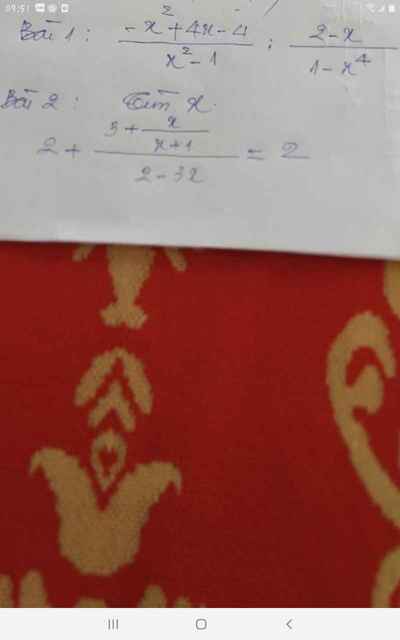
Hãy nhập câu hỏi của bạn vào đây, nếu là tài khoản VIP, bạn sẽ được ưu tiên trả lời.


\(\left(2a+3\right)\left(2a+3\right)y+\left(2a+3\right)\)
\(=\left(2a+3\right)[y\left(2a+3\right)+1]\)
\(=\left(2a+3\right)\left(2ay+3y+1\right)\)
\(\left(a-b\right)x+\left(b-a\right)y-\left(a-b\right)\) (Sửa đề)
\(=\left(a-b\right)x-\left(a-b\right)y-\left(a-b\right)\)
\(=\left(a-b\right)\left(x-y-1\right)\)


\(\left(3x+2\right).\left(2x-1\right)-6x.\left(x-1\right)-7x+4\)
\(=\left(6x^2-3x+4x-2\right)-\left(6x^2-6x\right)-7x+4\)
\(=6x^2+x-2-6x^2+6x-7x+4\)
\(=\left(6x^2-6x^2\right)+\left(x+6x-7x\right)+\left(-2+4\right)\)
\(=2\)
Vậy giá trị biểu thức không phụ thuộc vào biến \(x\)

\(ĐKXĐ:x\ne0;x\ne2\)
\(\frac{4x^2-4x^3+x^4}{x^3-2x^2}=-2\)
\(\Leftrightarrow4x^2-4x^3+x^4=-2\left(x^3-2x^2\right)\)
\(\Leftrightarrow4x^2-4x^3+x^4=-2x^3+4x^2\)
\(\Leftrightarrow x^4-2x^3=0\Leftrightarrow x^3\left(x-2\right)=0\)
\(\Leftrightarrow\orbr{\begin{cases}x=0\\x=2\end{cases}}\left(ktm\right)\)
Vậy không có x để phân thức bằng -2
Ta có : \(\frac{4x^2-4x^3+x^4}{x^3-2x^2}=-2\)
( ĐKXĐ : \(x\ne0,x\ne\pm\sqrt{2}\) )
\(\Leftrightarrow\frac{4x^2-4x^3+x^4}{x^3-2x^2}+2=0\)
\(\Leftrightarrow4x^2-4x^3+x^4+2\left(x^3-2x^2\right)=0\)
\(\Leftrightarrow-2x^3+x^4=0\)
\(\Leftrightarrow x^3\left(x-2\right)=0\)
\(\Leftrightarrow\orbr{\begin{cases}x=0\\x=2\end{cases}}\) ( Loại \(x=0\) không thỏa mãn ĐKXĐ )
Vậy : \(x=2\) thỏa mãn đề.

Khi f( x) : ( x - 2 ) ( x - 3) thì còn đa thức dư vì ( x - 2 ) ( x - 3 ) có bậc cao nhất là 2
=> đa thức dư có bậc cao nhất là 1
=> G/s: đa thức dư là: r(x) = a x + b
Ta có: f ( x ) = ( x - 2 )( x - 3 ) ( x^2 + 1 ) + ax + b
Vì f ( x ) chia ( x - 2 ) dư 2016
=> f ( 2 ) = 2016 => a.2 + b = 2016 (1)
Vì f(x ) chia ( x - 3 ) dư 2017
=> f ( 3) = 2017 => a.3 + b = 2017 (2)
Từ (1) ; (2) => a = 1; b = 2014
=> Đa thức f(x) = ( x - 2 )( x - 3 ) ( x^2 + 1 ) + x + 2014
và đa thức dư là: x + 2014
 Tính dùm tui bài 1 ik phép chia phân thức. ĐANG CẦN GẤP
Tính dùm tui bài 1 ik phép chia phân thức. ĐANG CẦN GẤP
a)\(\dfrac{-x^2+4x-4}{x^2-1}\\ =\dfrac{-\left(x^2-4x+4\right)}{\left(x-1\right)\left(x+1\right)}=\dfrac{-\left(x-2\right)^2}{\left(x-1\right)\left(x+1\right)}\)
b) \(\dfrac{2-x}{1-x^4}=\left(2-x\right):\left(1-x^4\right)=\dfrac{2}{\dfrac{x}{x^4}}\)
Bài 1:
\(=-\dfrac{x^2+4x-4}{x^2-1}.\dfrac{1-x^4}{2-x}=\dfrac{-\left(x^2-4x+4\right)}{\left(x+1\right)\left(x-1\right)}.\dfrac{-\left(x+1\right)\left(x-1\right)\left(1+x^2\right)}{2-x}\)\(=1+x^2\)